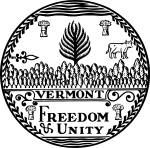1802–1803 United States House of Representatives elections in Vermont
Appearance
| |||||||||||||||||||
All 4 Vermont seats to the United States House of Representatives | |||||||||||||||||||
|---|---|---|---|---|---|---|---|---|---|---|---|---|---|---|---|---|---|---|---|
| |||||||||||||||||||
| Elections in Vermont |
|---|
 |
Vermont increased its apportionment from 2 seats to 4 after the 1800 census. Vermont law at the time required a majority of votes to win an office, which frequently necessitated additional ballots.
| District | Incumbent | Party | First elected |
Result | Candidates[Note 1] |
|---|---|---|---|---|---|
| Vermont 1 "Southwest district" |
Israel Smith | Democratic-Republican | 1791 1797 (Lost) 1800 |
Incumbent retired to run for U.S. Senator. New member elected. Democratic-Republican hold. |
√ Gideon Olin (Democratic-Republican) 54.3% Jonas Galusha (Democratic-Republican) 18.1% Abel Spencer (Federalist) 14.0% Chauncey Langdon (Federalist) 10.2% Daniel Fay 1.9% Others 1.5% |
| Vermont 2 "Southeast district" |
Lewis R. Morris | Federalist | 1797 (Special) | Incumbent lost re-election. New member elected. Federalist hold. |
First ballot (December 13, 1802): Lewis R. Morris (Federalist) 45.6% James Elliot (Federalist) 42.7% Paul Brigham (Democratic-Republican) 5.4% Amasa Paine (Federalist) 2.9% Others 3.4% Second ballot (March 1, 1803): √ James Elliot (Federalist) 54.1% Daniel Farrand (Federalist) 37.6% Aaron Leland (Democratic-Republican) 4.4% Lewis R. Morris (Federalist) 1.5% Others 2.3% |
| Vermont 3 "Northeast district" |
None (District created) | New seat. Federalist gain. |
√ William Chamberlain (Federalist) 53.9% Nathaniel Niles (Democratic-Republican) 38.2% James Fisk (Democratic-Republican) 7.3% Others 0.5% | ||
| Vermont 4 "Northwest district" |
None (District created) | New seat. Federalist gain. |
First ballot (December 13, 1802): Udney Hay (Democratic-Republican) 45.3% Martin Chittenden (Federalist) 28.2% Amos Marsh (Federalist) 19.6% Daniel Chipman (Federalist) 2.3% William C. Harrington (Federalist) 1.9% Others 2.7% Second ballot (March 1, 1803): Udney Hay (Democratic-Republican) 49.2% Martin Chittenden (Federalist) 29.8% Amos Marsh (Federalist) 19.9% Others 1.1% Third ballot (May 9, 1803): √ Martin Chittenden (Federalist) 54.0% Udney Hay (Democratic-Republican) 44.8% Others 1.2% | ||
See also
[edit]- United States House of Representatives elections, 1802 and 1803
- List of United States representatives from Vermont
Notes
[edit]- ^ Only candidates with at least 1% of the vote listed
